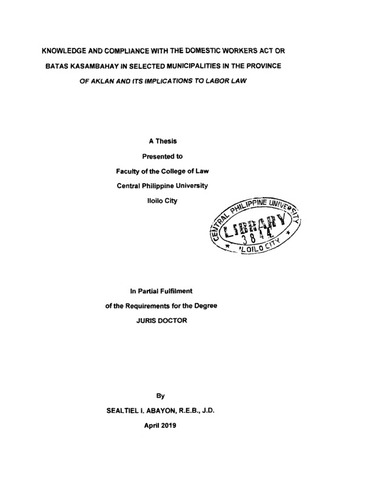Knowledge and compliance with the Domestic Workers Act or Batas Kasambahay in selected municipalities in the province of Aklan and its implications to Labor Law
| dc.contributor.adviser | Alibogha, Salex E. | |
| dc.contributor.author | Abayon, Sealtiel I. | |
| dc.coverage.spatial | Aklan | en_US |
| dc.date.accessioned | 2021-06-30T06:36:29Z | |
| dc.date.available | 2021-06-30T06:36:29Z | |
| dc.date.issued | 2019 | |
| dc.identifier.citation | Abayon, S. I. (2019). Knowledge and compliance with the Domestic Workers Act or Batas Kasambahay in selected municipalities in the province of Aklan and its implications to Labor Law (Unpublished postgraduate thesis). Central Philippine University, Jaro, Iloilo City. | en_US |
| dc.identifier.uri | https://hdl.handle.net/20.500.12852/1130 | |
| dc.description | Abstract only | en_US |
| dc.description.abstract | Republic Act 10361 otherwise known as Domestic Workers Act or Batas Kasambahay is highly significant because it underscores the need to afford special protection to domestic workers or kasambahay, the sector of workers, which in turn, affords household employers who are workers themselves the opportunity to focus on work elsewhere for their livelihood. Thus, the law translates into very concrete terms the constitutional mandate to afford “full protection” to labor wherever situated, regardless of status and nature of position. The need for full protection is more pronounced when the concerned worker renders services in the household wherein practically no monitoring by concerned government agencies can be done because the work of the kasambahay is hidden from view. Moreover, Republic Act 10361 serves as our country’s compliance with the commitment it made on Sept. 5, 2012 to implement ail the obligations provided in the International Labor Organization’s Convention No. 189 (2011), concerning decent work for domestic labor. This thesis aimed to determine the knowledge and compliance with the Domestic Worker Act or Batas Kasambahay in selected Municipalities in the Province of Aklan and its implications to Labor Law. The socio-economic profile of the domestic workers or kasambahay are taken into account in terms of occupation, religion, income and age and how they relate with their knowledge and compliance with Domestic Workers Act or Batas Kasambahay. The thirty (30) domestic workers or kasambahay were the subjects of the study in the selected Municipalities in the Province of Aklan. Quantitative descriptive research design was used in this study to determine the knowledge and compliance with RA10361. The data were collected, sorted and tabulated based on the requirements of the study that were analyzed. | en_US |
| dc.format.extent | vii, 62 leaves | en_US |
| dc.language.iso | en | en_US |
| dc.rights | Attribution-NonCommercial-NoDerivs 3.0 Philippines | * |
| dc.rights.uri | http://creativecommons.org/licenses/by-nc-nd/3.0/ph/ | * |
| dc.subject.ddc | Law Library 340.72 Ab18 2019 | en_US |
| dc.subject.lcsh | Household employees | en_US |
| dc.subject.lcsh | Household employees--Legal status, laws, etc. | en_US |
| dc.subject.lcsh | Employee rights | en_US |
| dc.subject.lcsh | Labor laws and legislation | en_US |
| dc.subject.lcsh | Philippines--Aklan | en_US |
| dc.title | Knowledge and compliance with the Domestic Workers Act or Batas Kasambahay in selected municipalities in the province of Aklan and its implications to Labor Law | en_US |
| dc.type | Thesis | en_US |
| dc.description.bibliographicalreferences | Includes bibliographical references | en_US |
| dc.contributor.chair | Bedona, Zacarias D. Jr. | |
| dc.contributor.department | College of Law | en_US |
| dc.description.degree | Juris Doctor | en_US |
| local.subject | RA 10361 | en_US |
| local.subject | Batas Kasambahay | en_US |
| local.subject | Domestic Workers Act | en_US |
이 항목의 파일
This item appears in the following Collection(s)
-
Juris Doctor [144]



